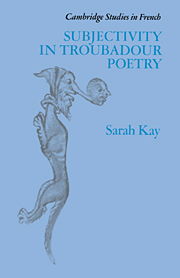2 - Allegory
Published online by Cambridge University Press: 22 August 2009
Summary
The last chapter was concerned with the organization of rhetoric around the subject position in lyric poems, and the repercussions of rhetorical complexity on our reading of their ‘subjectivity’. In this one, I shall consider rhetorical techniques whose function appears to be to describe or extend the subject as a psychological entity or ‘self’: the use of personified abstractions (Amors, Jovens, Merce etc.), the narrativization of faculties (heart, will, desire, etc.), and the use of inner dialogue. These techniques, whose use in troubadour poetry is widespread, can all loosely be classified as allegorical. There will be no attempt to retract what has been said about the difficulty of estbalishing ‘meaning’ in these texts; on the contrary, elusiveness of meaning and elusiveness of self-hood are closely connected, whether through uncertainty about perception and epistemology which mediate them both, or because of anxiety about the interrelation of subjectivity and language. I shall argue that while all three of these allegorical devices seem very explicit, even mechanical, their use draws attention to uncertainty on crucial questions relating to the subject. What is its relation to the notion of the ‘self’? Is such a self stable or changing, single, multiple, or collective? How does it relate to other selves? What is the relation of the subject to language?
- Type
- Chapter
- Information
- Subjectivity in Troubadour Poetry , pp. 50 - 83Publisher: Cambridge University PressPrint publication year: 1990



